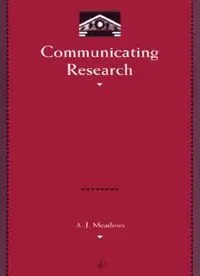Table Of ContentCommunicating Research
Library and Information Science
Consulting Editor: Harold Borko
Graduate School of Library and Information Science
University of California, Los Angeles
Harold Borko and Charles L. Bemier
Abstracting Concepts and Methods
F. W. Lancaster
Toward Paperless Information Systems
H. S. Heaps
Information Retrieval: Computational and Theoretical Aspects
Harold Borko and Charles L. Bernier
Indexing Concepts and Methods
Gerald Jahoda and Judith Schiek Braunagel
The Librarian and Reference Queries: A Systematic Approach
Charles H. Busha and Stephen P. Harter
Research Methods in Librarianship: Techniques and Interpretation
Diana M. Thomas, Ann T. Hinckley, and Elizabeth R. Eisenbach
The Effective Reference Librarian
G. Edward Evans
Management Techniques for Librarians, Second Edition
Jessica L. Milstead
Subject Access Systems: Alternatives in Design
Dagobert Soergel
Information Storage and Retrieval: A Systems Approach
Stephen P. Harter
Online Information Retrieval: Concepts, Principles, and Techniques
Timothy C. Craven
String Indexing
The list of books continues at the end of the volume.
Communicating Research
A. J. Meadows
Department of Information and Library Studies
Loughborough University
Loughborough, Leicestershire, United Kingdom
Academic Press
San Diego London Boston New York Sydney Tokyo Toronto
This book is printed on acid-free paper.
Copyright © 1998 by A. J. Meadows
All Rights Reserved.
No part of this publication may be reproduced or transmitted in any form or by any
means, electronic or mechanical, including photocopy, recording, or any information
storage and retrieval system, without permission in writing from the publisher.
Academic Press
a division of Harcourt Brace & Company
525 B Street, Suite 1900, San Diego, California 92101-4495, USA
http://www.apnet.com
Academic Press Limited
24-28 Oval Road, London NW1 7DX, UK
http://www.hbuk.co.uk/ap/
Library of Congress Cataloging-in-Publication Data
Meadows, A. J. (Arthur Jack)
Communicating research / A.J. Meadows.
p. cm. — (Library and information science)
Includes index.
ISBN 0-12-487415-0 (alk. paper)
1. Research—communication systems. 2. Communication in science.
3. Communication of technical information. I. Title. II. Series:
Library and information science (New York, N.Y.)
Q180.55.I45.M43 1997
001.4'01'4-dc21 97-23432
PRINTED IN THE UNITED STATES OF AMERICA
97 98 99 00 01 02 QW 9 8 7 6 5 4 3 2 1
Contents
Preface ix
1
Change and Growth
Early Comunication 3
The Advent of the Research Journal 5
The Role of Societies 8
Journal Layout 1
The Acumulation of Research 13
Rapid Growth and Its Implications 18
Specialization and Research 21
The Profesionalization of Research 24
Amateurs and Others 26
Information Growth and the Researcher 29
The New Electronic World 32
2
Research Traditions
The Development of Disciplinary Divisions 39
Subject Development 43
The Conceptual Basis in Science 48
Science and Other Disciplines 52
Knowledge Divisions 56
Examining Subject Diferences 61
Subject and Communication Diferences 6
Communication to a Wider Public 70
Information Technology and Subject Diferences 74
v
VI Contents
3
Who Does Research and with What Results?
The Reason Why 79
Psychological Factors 82
Productivity 85
Quality 89
Leading Researchers 93
Age 98
The Research Community 101
Colaboration 107
The Impact of New Technology 111
4
Channels for Communicating Research
Design for Reading 16
Readability of Text 120
The Act of Reading 12
Publishers 125
Libraries 129
Oral Communication 13
Conferences 137
Human Networks 139
Information Flows 143
Electronic Chanels 149
Electronic Networks and Readers 153
5
Making Research Public
Types of Publication 160
Diferent Publication Outlets 164
Writing for Publication 170
Editors and Referes 17
Referes and Authors 183
Particular Problems 189
Quality Control of Books 194
Research and the Media 199
Electronic Publishing 20
Contents Vi
6
Finding Out about Research
Seking Research Information 205
Information Requirements 209
Organizing Personal Information 214
The Scater of Information 217
The Age Distribution of Information 220
Implications of Literature Usage 224
Electronic Retrieval of Information 227
Electronic Communication 232
The Mas Media 237
Postscript 239
References 243
This page intentionally left blank
Preface
Communication lies at the heart of research. It is as vital for research as
the actual investigation itself, for research cannot properly claim that name
until it has been scrutinized and accepted by colleagues. This necessarily
requires that it be communicated. Again, the support of research is costly.
Such funding is wasted unless the results of the research are presented to their
appropriate audiences. Whichever way one looks at it, efficient and effective
communication is an essential part of the research process.
I first became interested in the nature of research communication back
in the 1960s. Research activity, especially in science, was then expanding
rapidly in the Western world. The question inevitably arose—how much
longer can this expansion continue? Extrapolation suggested that by the end
of the century—where we are now—something would have to give. Growth
in funding, and consequently in the number of researchers would have to
slow down. The follow-up question, though asked less frequently at the time,
was this: Given that funding would be affected, how could the money avail-
able be used to produce the maximum amount of high-level research? At
that stage, I was working in the Department of Printed Books and
Manuscripts at the British Museum (now a part of the British Library) in
London. What interested me was a particular aspect of this problem: How
could the communication of research be handled most efficiently as funding
slowed? The answer again seemed obvious. Computers were already being
used for information handling in the 1960s. Their future development would
surely allow the rapid manipulation of large quantities of information and
make them increasingly effective tools for the communication of research.
After the British Museum, I returned to academic life, working in
astronomy, the history of science, and, finally, information and library studies.
The first two fields provided an interesting contrast in how researchers in the
sciences and those in the humanities handle information. Researchers in
these two fields see the world from different angles; their ideas on the nature
of acceptable knowledge differ, and their research communities are organized
IX

